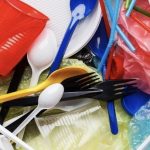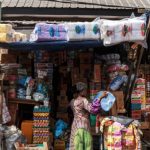The Lagos State Government has stepped up its battle against environmental pollution with the seizure of banned Styrofoam products and single-use plastics valued at over N2.5 million during enforcement operations across major markets and shopping malls in the state.
The Lagos Environmental Sanitation Corps (LAGESC), popularly known as Kick Against Indiscipline (KAI), carried out the operations in Agege, Oshodi, Idumota, Mushin, Victoria Island, and Lekki, following intelligence reports that traders were defying the prohibition order. The Corps Marshal, Major Olaniyi Olatunbosun Cole (Rtd), confirmed the seizures and warned that the government would no longer tolerate violations of the ban.
According to him, the prohibition on Styrofoam, which was first announced in January 2024, has been extended to cover a wider range of single-use plastics, with the state beginning full enforcement on July 1, 2025. He explained that the directive was not merely regulatory but aimed at safeguarding both the environment and public health, given the devastating impact of plastic pollution on Lagos’ waterways and coastal communities.
Cole described single-use plastics as “a major environmental threat” with no recycling value, stressing that their non-biodegradable nature leads to clogged drains, worsens flooding, and endangers marine life. He pointed out that the government’s decision to outlaw these products remains in the best interest of residents. “The state cannot continue to allow practices that destroy the ecosystem and put people’s health at risk,” he said.
The Corps Marshal clarified that the ban does not cover all plastics. PET bottles, sachet water, and nylon bags above 40-micron thickness remain exempt. Items that are strictly outlawed include Styrofoam food packs, disposable cups, plastic straws, cutlery, and lightweight nylon bags. He said this clarification was necessary to counter false claims being spread by what he described as mischief makers seeking to confuse the public.
The enforcement drive, he added, will continue across markets and malls, with repeat offenders facing penalties under Lagos State environmental laws. He also issued a strong warning to traders against displaying goods for sale on road setbacks, verges, medians, and drainage slabs, noting that such practices are illegal and contribute to the obstruction of pedestrian movement and road safety.
Beyond plastics, Cole used the opportunity to remind Lagosians of other ongoing environmental campaigns, including the proper use of pedestrian bridges and the need to stop open urination, open defecation, and indiscriminate refuse dumping, all of which worsen the city’s sanitation and flooding challenges.
The Lagos State Government had earlier explained that the crackdown forms part of a broader environmental sustainability agenda. Officials argue that reducing single-use plastic consumption is critical in a state as densely populated as Lagos, where millions of tonnes of plastic waste are generated each year, much of which ends up in canals, lagoons, and the Atlantic Ocean.
Environmentalists have long warned that the indiscriminate use of Styrofoam and plastics poses dangers not only to drainage systems but also to human health, as toxins from these products often leach into food and water sources. The ban is therefore seen as a step toward aligning Lagos with global best practices on waste reduction and climate resilience.
While some traders and food vendors have expressed concern about the rising cost of alternatives to Styrofoam, the government maintains that long-term benefits outweigh the short-term inconvenience. Authorities have encouraged the use of biodegradable packaging and reusable materials as substitutes, arguing that a transition to sustainable options is unavoidable.
With the latest operation, the state has sent a strong signal of its readiness to enforce compliance. As the enforcement continues, Lagosians will be watching to see how effectively the government can balance environmental protection with economic realities in Africa’s largest commercial hub.










